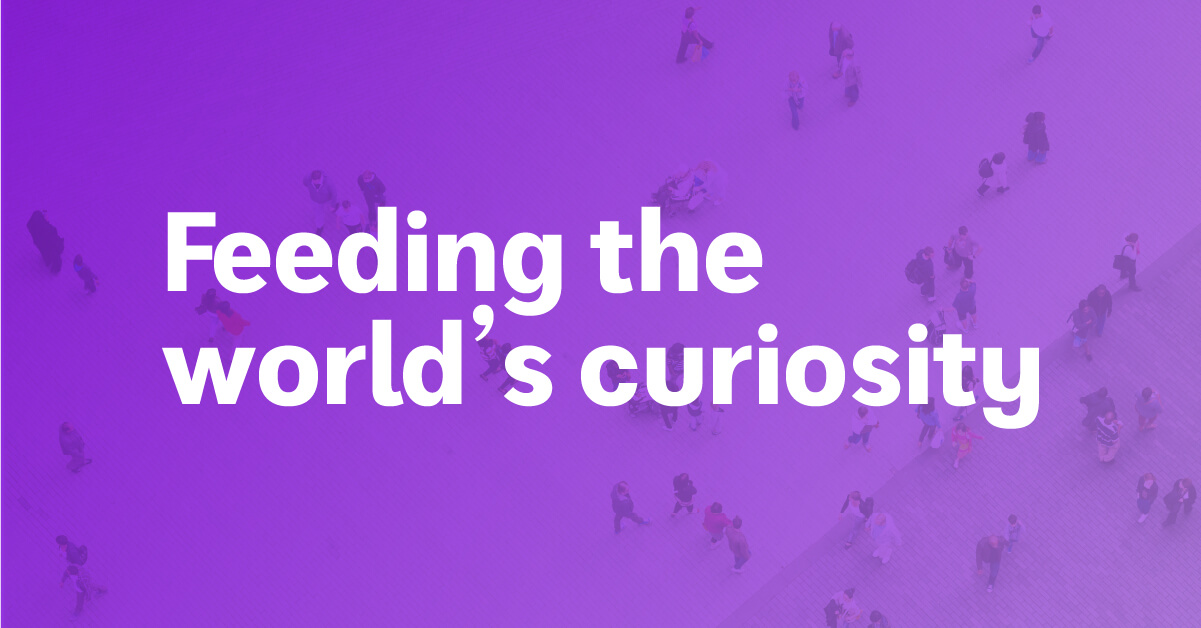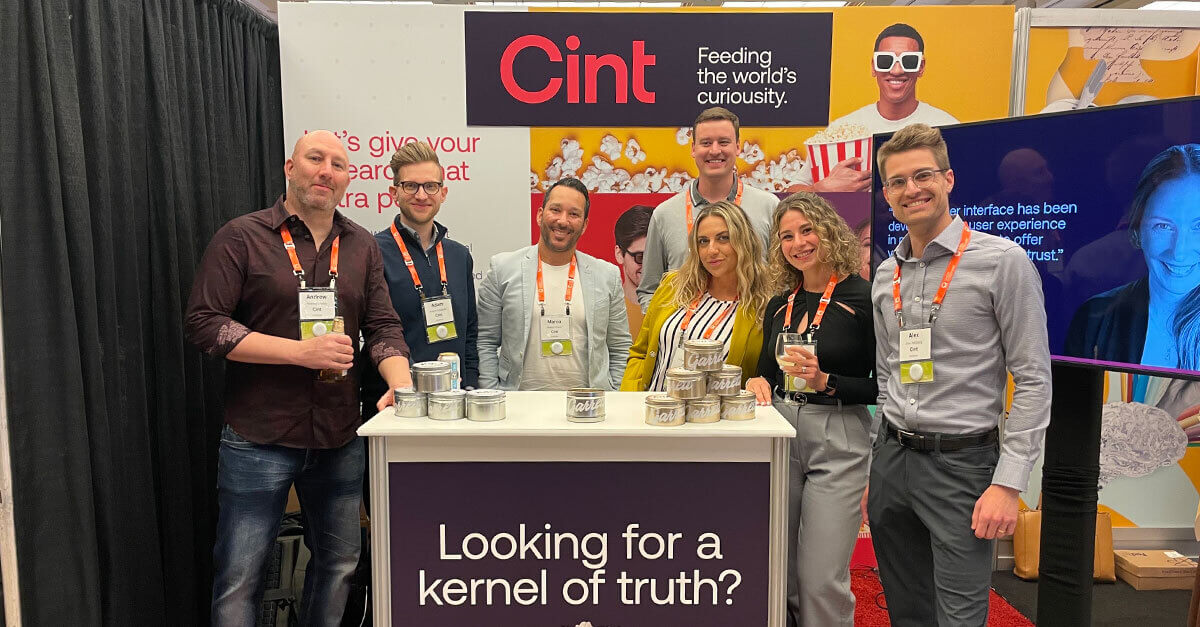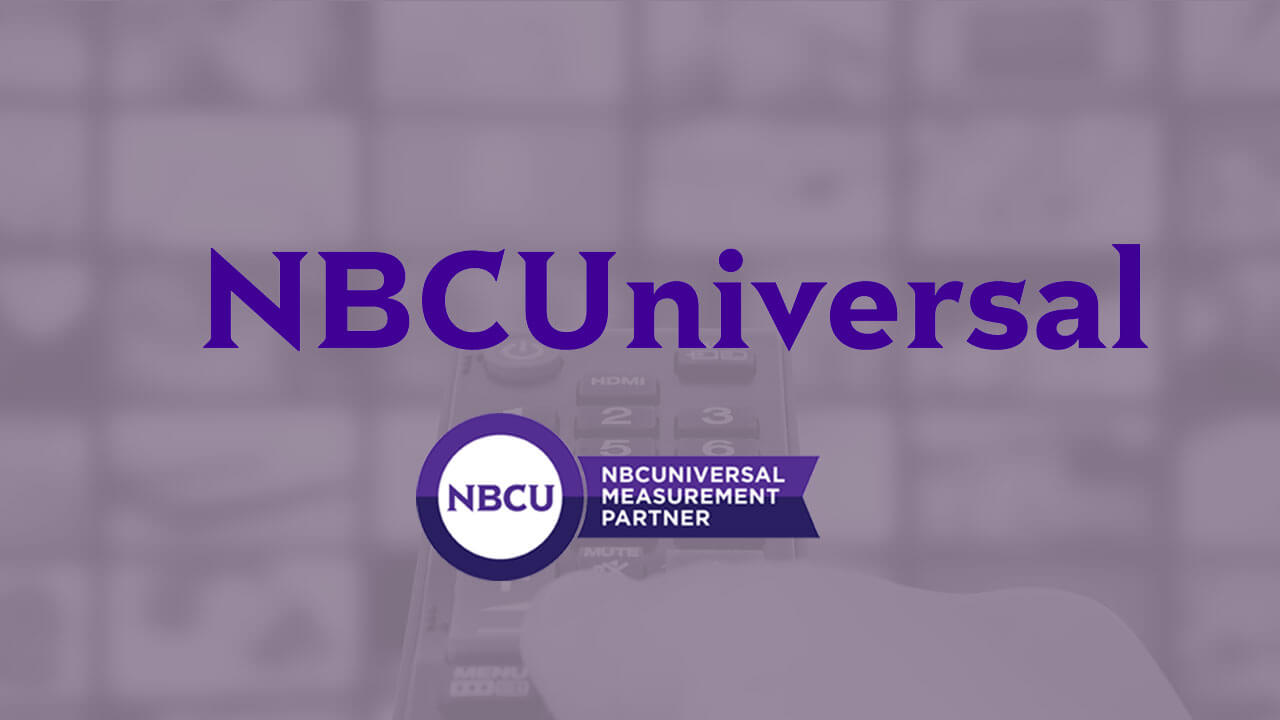Blog
How ResTech Enables Data-driven Knowledge without Sacrificing Privacy

Blog
More from our blog
-

Getting to the point: Faster insights now for better outcomes later
Ed Stone, Cint’s Director of Data Solutions & Measurement gives us the lowdown on how to do more with less in the ever-evolving measurement landscape.
-

A full-stack guide to monetizing your audience
Want to monetize your audience but don’t know where to start? Read on to get the lowdown.
-

Making the most of the industry’s biggest marketplace as a buyer
Discover how the Cint Exchange operates and why it could benefit your business.
-

Cint raises 596 million SEK to support new strategy
Cint CEO Patrick Comer discusses Cint’s recent successful Rights Issue
-

Soothing cross-platform measurement challenges for marketers in 2025
Christopher Pope, Senior Director, Data and Measurement at Cint talks us through marketer concerns and how to solve them.
-

Making the most of the industry’s biggest marketplace as a supplier
Generate revenue and reward your members with ease by connecting to the world’s largest marketplace as a supply partner.
-

A practical guide to integrating Restech into your tech stack
Here’s how to boost your research practices with Cint.
-

What is the difference between a brand tracker and brand lift study?
Brand trackers and brand lift studies are valuable insights tools for measuring consumer sentiment about a brand. Let’s explore what makes these types of studies unique and how they can most effectively be applied to your needs.
-

How to engage and retain diverse respondent supply
Survey research can’t happen without survey respondents. So how can panels and researchers ensure that respondents have a positive experience?
-

Why is data quality so important when it comes to programmatic research?
Two experts explain why when you’re working with programmatic research, quality is key.
-

Are streaming habits reshaping the advertising industry?
Our latest report explores the relationship between streaming and advertisers ahead of 2025’s Upfronts.
-

Fighting bots with bots: how to combat AI-driven fraud
Cint’s Jimmy Snyder, Vice President of Trust and Safety, and Shelby Downes, Senior Program Manager, discuss a range of approaches for taking action against the bots.
-

How can the market research industry act ethically in 2025?
A panel of experts voice their opinion on how market research and insights professionals can foreground concerns around ethics in the year ahead.
-

What are the challenges facing market researchers in 2025?
A panel of experts voice their opinion on what difficulties insights professionals need to be aware of in the year ahead — and how best to approach them.
-

Where will the market research industry take AI next?
A panel of experts voice their opinion on how market research and insights professionals will continue to foreground automation in their methodological approach.
-

Lucid Measurement 2024: a year of innovation
Read a recap of what we added to Lucid Measurement in 2024, and enjoy a sneak peek of where we’re going in 2025
-

What does the market research industry make of AI and synthetic data?
Introduction Across the market research industry, more and more organizations and companies are using AI to speed up audience insights analysis. The reason is simple: AI can streamline previously lengthy processes. Formerly time-consuming work can now be done in seconds, with human beings on hand to ensure accuracy. AI tools save time and money but…
-

4 ways in-flight measurement can help stretch your marketing budget
Knowing how to prioritize your limited budget while increasing the impact of your digital advertising will make the difference between success and just getting by this year.
-

Building the right tech partnerships: KFC U.S. and Cint’s ‘Finger lickin’ good’ recipe for success
At TMRE 2024 in Orlando, KFC’s Renee Reeves joined Cint’s Ryan Fletcher for a fireside chat on how building the right tech partnerships is the (not-so-secret) recipe for fostering a culture of innovation and setting your insights team up for success.
-

Surviving party season: CintSnap explores festive fatigue
Ready for a slew of parties, or dreading the prospect? Cint explores consumer attitudes toward a potentially massive month of social outings.
-

Eat, shop, repeat: CintSnap delves into Thanksgiving consumer trends
We examine the relationship between Thanksgiving and one of the biggest sales events of the year, Black Friday Cyber Monday (BFCM).
-

How Cint uses gender neutral language in job advertisements
We speak with Andy Perricone, Senior Talent Acquisition Manager at Cint to find out how Cint avoids gendered language in job ads, why it matters, and how we foster inclusivity that attracts the top talent from all genders and backgrounds.
-

Preparing for 2025: Insights on marketing and data collaborations
In 2025, global advertising spend is predicted to surpass $1 trillion—a milestone so monumental it could stretch dollar bills to the sun and back. However, beneath this record-breaking number lies a complex reality: while data is abundant, marketers and agencies still face significant challenges in unlocking its full potential. A recent research collaboration between Lotame…
-

CintSnap survey uncovers 2024 holiday travel trends and the use of AI in travel planning
As the festive season approaches, travelers worldwide are packing their bags for one of the busiest travel periods of the year – but not without a little help from technology. If the idea of using AI as your personal travel assistant sounds appealing, you’re not alone. This year, holiday travel trends reveal not only a…
-

John Lewis tops the tree in the Christmas ads anticipation stakes
The advertising industry’s biggest few weeks of the year are here. What do UK viewers and consumers want from their Xmas ads?
-

How popular is the poppy in 2024?
Ahead of Remembrance Day, Cint asks whether or not wearing a poppy is still a big deal in the UK.
-

Get to know our latest tool for brand lift studies: Study Creator
Find the full lowdown on Cint’s Study Creator tool, including the workflow process, benefits, and our latest video tutorial.
-

CintSnap explores US viewing habits ahead of the election
A huge election is also a huge moment for broadcasters. How will Americans be tuning into election night 2024?
-

TikTok, Deepfakes, and Political Ads: A study on the relationship between media and the upcoming election
Cint and Advertising Week partnered on research looking into the relationship between media influence and voter behavior leading up to this year’s US and UK elections.
-

Cint Trust Score – Inside the thinking AI brain
Cint’s experts break down the importance of our Trust Score model
-

CintSnap uncovers US and UK consumer Halloween 2024 spending habits and traditions
We take a look at the difference in spooky, seasonal spending habits and traditions in the US and the UK.
-

Step into a new era of the Cint brand with us
Find out how the Brand team used visual cues and language to bring the new brand vision to life.
-

The festive shift: How Diwali is driving India’s digital transformation across four key sectors
From ordering food online to the rise in quick commerce, our comprehensive Diwali survey reveals how technology is reshaping the way people prepare for and celebrate Diwali.
-

Getting the work-life balance right: Cinters share their hobbies outside of work this World Mental Health Day 2024
From carnival chasing to pilates, and kitesurfing to kickboxing, our international employees at Cint talk about how their hobbies keep stress under control.
-

Introducing Women@Cint
Cint is committed to making ourselves a more diverse and inclusive workforce. Here’s how we’re making that happen.
-

CintSnap takes a deep dive into the 2024 Formula One World Championship frenzy.
It might be the world’s premiere motorsport, but has F1 truly caught the attention of audiences in the US, UK and Australia?
-

How data-driven decision making is revolutionizing industries
A conversation with France Lasnier, SVP, for UK, France, Central Europe and Louis Nix, Senior Analyst, Product Operations, on the importance of a data-driven approach for companies.
-

How Cint keeps your data safe — and secure
A conversation with Cint experts Dhruv Mathur, Vice President, Information Security and Caroline Tahon, Data Protection Officer, on keeping data as safe and secure as possible.
-

Cint helps Push Digital uncover gaps in voter support and form insights to optimize targeting
Push Digital, a campaign agency active in America’s highest stakes races and debates by leveraging their digital expertise to start conversations, persuade audiences, and turn out voters, partnered with Cint on a study to uncover gaps in voter support.
-

Did you have a Brat summer?
Charli XCX might have dominated airwaves this summer, but how did the Brat campaign impact consumer habits?
-

Notting Hill Carnival 2024: CintSnap reveals UK sentiments around main attractions, sustainability, and diversity initiatives
Using CintSnap, we surveyed 300 UK respondents on how they plan to engage with the iconic celebration and what aspects of the event excite them the most.
-

Paralympics 2024: CintSnap reveals UK consumer insights on viewing habits, the most popular sporting events, and brand sponsorship
Using CintSnap we surveyed 300 people in the UK on how they plan to engage with the Games, most watched sports, and how brand sponsorship is perceived.
-

Back-to-school Survey: How Americans are preparing for the new school year ahead
Using CintSnap, we surveyed 300 Americans to reveal some trends and preferences on how they gear up for the academic year ahead.
-

The Booker Effect: Do literary prizes influence reading — and spending — habits?
Using CintSnap, we conducted a poll with approximately 300 people from the UK to explore what they read, how they read, and what persuades them to take a punt on a new title.
-

Guide to measuring political advertisements with Lucid Impact Measurement
Explore our guide to measuring political advertisements by Cint’s in-house expert Chris Pope, Senior Director of Measurement.
-

‘We Hear You’ – Cint Exchange launch with Lindsay Fordham
Discover the latest platform developments at Cint with Lindsay Fordham, SVP, Product.
-

2024 Paris Summer Games
With the 2024 Paris Summer Games underway, Cint surveyed 400 French people to gauge sentiments around the world’s largest sporting event.
-

The TikTok effect: How the video-sharing platform is shaping voter behavior
As the UK headed to the polls on July 4th, Cint conducted a study to reveal TikTok’s influence of voters.
-

How researchers at Employment Hero explored the potential power of automated payroll procedures
HR, payroll and recruitment solution specialists Employment Hero conducted a survey with Cint to delve deep into how AI assistance could be a boon for payroll professionals across Australasia.
-

How pumped are people for Amazon Prime Day? CintSnap finds out.
As one of retail’s biggest events rolls around, we gather insights into consumer spending habits in the US, UK and Australia.
-

The Market Research Industry Isn’t Focusing Enough on Data Ethics; How to Solve It
Maintaining data ethics is critical in market research, especially with the rise of AI technologies. Transparency, compliance with regulations, and educating employees ensure consumer information is protected.
-

CintSnap reveals top reasons people in the UK flock to music festivals
With Glastonbury around the corner and a summer of festivals in full swing, we delve into everything from sustainability to the allure of secret sets.
-

CintSnap explores what consumers think about Father’s Day
As Father’s Day looms, Cint gets to grips with how people in the US and UK plan to celebrate – and how much they’re prepared to spend.
-

With Euro 2024 round the corner, we use CintSnap to assess just how football crazy the UK is
Our most recent CintSnap explores how much of the tournament people plan on watching and who they’ll be doing it with.
-

How a researcher at Harvard University successfully decoded the opinions of independent voters
Political scientists Andrew O’Donohue and Daniel Markovits conducted a survey with Cint to understand how prosecution of Donald Trump affected public opinion among independent voters.
-

Ariel Madway, Associate Director, Marketing Events on the upcoming events season
From London to Malaga and Cairns, Ariel Madway takes us on a journey through Cint’s busy events season, her planning inspiration and what she’s most excited about.
-

TV upfronts and NewFronts – and CintSnap insights into the state of streaming 2024
Both CTV and linear TV advertising present big opportunities for advertisers. In particular, the booming demand for CTV ads. We look at what the TV upfront and NewFronts are all about and the state of streaming in 2024.
-

Exploring insights on consumer sentiments around sustainability
We look at two recent reports published in partnership with Cint, that focus on global consumer sentiments around sustainability.
-

How to successfully navigate niche audiences: A teaser to our Whitepaper
In the world of market research, finding and engaging with niche audiences can feel like navigating uncharted territories. Gaining insights demands innovative strategies and streamlined processes.
-

CintSnap unveils the divide: Tipping culture in the US vs UK
When it comes to social customs and norms, few practices are as divisive as tipping expectations. We use CintSnap to survey consumer behaviour around tipping in the US and UK.
-

Going behind the scenes of CintSnaps: Best practices and fielding questions
Today we give you a look at how we take the pulse of the public, so you don’t have to…
-

Advanced Strategies: Market research data for strategic excellence
We delve into techniques and strategies used by big-hitters for leveraging market research data.
-

“And the winner is..” CintSnap insights into the 2024 Oscars
With the prestigious Academy Awards marking its 96th year, we set out to discover if the glitz and glam of ceremony still holds weight in determining viewing habits of filmgoers, as well as why people tune in, how predictions played out and who they thought should have won the coveted golden globes.
-

International Women’s Day 2024. Cint’s Women in leadership share their career insights
To celebrate International Women’s Day, we asked some of our incredible women in leadership share their best career advice.
-

Insights into International Women’s Day 2024
International Women’s Day is an opportunity to celebrate wins, raise awareness and get conversations going. We’ve dived into the narrative at Cint by uncovering the insights around International Women’s Day.
-

Independent study names Cint #1 supplier of accurate survey responses
We’re proud to share that Cint, a global leader in market research, emerged as the leader in sample quality for online polls in a third-party study. Sapio Research, a UK market research agency, conducted the study to understand if online surveys are accurate. Sapio surveyed 2,036 UK consumers – representative by age and gender of…
-

Taking a (cupid’s) shot at consumer spending habits on Valentine’s Day 2024
For Valentine’s Day 2024, the National Retail Federation predicts that consumers will spend $25.8 billion. We used CintSnap to find out how people in the US and the UK approach this romantic season, by surveying 300 respondents.
-

Ensuring high quality sample: Introducing Cint Trust Score
John Brackett, Director of Product, introduces our latest AI-powered innovation designed to elevate data quality
-

New Report: Unlocking insights on The Big Game
As football fever grips the nation, the anticipation for this year’s game is reaching unprecedented heights. We surveyed the nation to understand more about how people are planning to watch, and so much more.
-

Celebrating International Data Protection Day with Caroline Tahon, DPO at Cint
On the 28th of January every year, the importance of personal data, and of Personal Identifiable Information (PII) is celebrated across the world on Data Protection Day.
-

Game, set, match: Insights into The Happy Slam
The Australian Open is the first of the four Grand Slam tennis tournaments to occur. We uncovered spectator experience through preferences and behaviors of our 280 respondents across Australia.
-

Redefining your experience with Cint: An exclusive look at our API-first approach
Nick Richards, Director of Product, shares an update on the work his team have been doing to comprehensively integrate every corner of product offerings on the new platform.
-

Feeling blue? CintSnap investigates the “most depressing day of the year”
With the festive season well behind us, and gloomy skies looming above, January for a myriad of reasons, isn’t the most exhilarating of months. This sentiment is so nationally widespread that in 2005, a UK-based travel agency coined the term ‘Blue Monday’ to mark the most depressing day of the year.
-

2024 Leisure travel takes flight: CintSnap unpacks vacation plans
January is a popular time for reflection and what better month to get our plans organised for the year ahead of us? A new year represents new uncharted destinations we’ve yet to discover, and for some, the usual trusted spots bring familiar comfort to recharge weary batteries.
-

Embracing gender inclusivity: Empowering market research with accuracy and impact
Vishal Bhat – Program Manager, Susi Lindner – Vice President, and Sonali Kaushal – Senior Manager at Cint discuss the importance of being inclusive in language around gender.
-

AI in the Workplace
If Taylor Swift took up the greatest amount of air space and attention in pop culture this year; the rise of artificial intelligence (AI) – and its impact on jobs – took up the greatest amount of air space and attention in professional settings.
-

Ready for 2024? We look at your New Year resolutions
Saving money, eating less meat and going sober…Patricia Petrat takes a deep dive into how people across the world are ringing in the year ahead.
-

2023 in Review: Your favourite CintSnaps, ranked
Since there’s nothing we love more than a data driven trip down memory lane, we’ve rounded up the top 10 #CintSnaps which got the highest engagement from you this year.
-

The CEO view: “Think it over, think it under.”
When I took the reins from Tom Buehlmann on the 3rd of April of this year, the integration of Cint, Lucid, Gapfish and P2Sample was well under way – but there was still work to do. A lot of work.
-

Revolutionizing the Cint experience: A glimpse into the future
Our first video in our new interview series is with Jonathan Jaynes, Senior Director of Product Design, Cint, who shares an insider’s perspective on the groundbreaking developments underway.
-

Unwrapping the festive magic with CintSnap: A look into consumer feelings around Christmas ads
Our most recent CintSnap takes a festive peek into the sentiments the UK public to unveil their thoughts on this year’s Christmas ads. Join us in unwrapping the findings and discovering what makes these ads a seasonal staple for UK consumers.
-

Navigating the transition: behind the scenes of our new platform
When we talk about migrating customers and supply partners to our new platform, we understand that concerns may arise. In this blog post, we want to address some of the worries you may have, and give a little reassurance about the process. You’re in good hands, we promise!
-

Influencers, Inspiration, and Inflation: Key topics driving holiday shopping habits in 2023
The build up to the holiday season is almost palpable, Christmas lights illuminate city centers and cheese fondue and mulled wine start popping up on the menu. We pull out our coziest socks from the attic storage and gear up for hours of Home Alone movie marathons and engage in another big part of the yearly tradition -…
-

CintSnap delves into Black Friday and Cyber Monday shopping trends
As Black Friday and Cyber Monday (BFCM) sales continue to skyrocket and dominate global retailer revenues, Cint takes a deeper look into consumer behaviors in the US, UK, Canadian and Australian markets, and the shopping habits that drive this highly anticipated shopping season.
-

The Beatles ‘Now and Then’: CintSnap reveals consumer sentiments of AI’s impact on the music industry
Using Cint’s owned data – that we call CintSnap – we gathered some insights around sentiments surrounding consumer behavior of the implementation of AI in the music industry, specifically on the posthumous Beatles collaboration.
-

Answering your questions: what does it take to build a new platform?
Innovation is in our DNA, and our mission has always been to bridge the gap between real people and organizations striving to understand and serve them. With this in mind, we’ve embarked on an exciting journey of transformation – building a new platform that will redefine the way our customers can access and leverage consumer…
-

Measuring brand lift in real-time: Leveraging Lucid Impact Measurement by Cint for in-flight optimization on cross-platform campaigns
Stephanie Gall, Director of Measurement Products at Cint, examines the use of Lucid Impact Measurement to optimize advertising campaigns across linear and connected TV, digital and social channels
-

The next chapter of Cint: A new phase of innovation and creativity
Read on for a brief outline of the latest developments in our new platform as we continue on an exciting journey with our partners, led by our core purpose – to feed the world’s curiosity
-

Behind the scenes at Cint: with Events Director, Ariel Madway
In today’s blog we spend a bit of time getting to know one of our superstar team members – one who you may have met on the MR events circuit this fall.
-

Webinar: Improving data quality and mitigating fraud
Our recent webinar hosted by Oscar Carlsson, Chief Innovation Officer, provided an overview of industry data quality trends and outlined what Cint is doing to help.
-

5 pillars to success: In conversation with Jimmy Snyder, VP, Trust and Safety, Cint
Jimmy oversees an operational team focused on creating and implementing quality-related programs and policies. He shares how the team helps to ensure a healthy and efficient market research ecosystem.
-

How to monetize your community
Monetizing your community involves strategically leveraging its value to generate revenue. Let’s say you have an online forum, social media group or a thriving platform with active members. You can transform your online community into a profitable asset. You can monetize your community in various ways. This post explores the ins and outs of community…
-

Working to deliver best-of-breed consumer intelligence
John Brackett is Director of Product, working across supply, respondent experience, and trust and safety. Here he outlines some of the actions being taken to optimize one of the world’s largest digital marketplace for research sample.
-

Lucid awarded NBCU Brand Measurement certification
Lucid, a Cint Group company, has been chosen by NBCUniversal as a brand measurement certified partner. The selection was made based on solution readiness, deliverables, and market presence.
-

Cint Snap reveals what consumers want from US Open commercials
With the final Grand Slam tournament of the year fast approaching, Cint uncovers the most successful strategies for brand engagement by asking consumers their thoughts on the sporting extravaganza
-

How to recruit survey respondents
When conducting market research, finding participants for a survey is crucial to gather valuable insights. Survey respondents provide the data necessary to understand target audiences and build action plans for reaching them. Their input enables data-driven decision-making, improves product or service offerings, and helps tailor marketing strategies to meet customer needs effectively.
-

How media measurement can help the food and beverage industry
The food and beverage industry is highly dynamic and constantly evolving, with new trends and consumer preferences always emerging. In such a fast-paced and competitive landscape, staying ahead of the game is critical for success. That’s where media measurement comes in.
-

In the Rise of CTV, How Do You Effectively Measure It?
CTV’s customized strategies provide marketers with massive amounts of analytics. With all the viewership data CTV provides, it often seems complicated to measure specific goals for your campaign. Using CTV measurement is critical for understanding your ad performance and information about your viewers.
-

Why real-time measurement is crucial for back-to-school and holiday campaign success
The Back- to- School and Holiday Shopping seasons are changing rapidly, short in nature and extremely lucrative. This blog explains the power of leveraging real-time measurement to optimize your campaign; not after completion, but while consumers are still buying.
-

Improving Qualification Data and Screening Questions for High-Quality Survey Results
Learn how to enhance the quality of your survey results by optimizing qualification data and screening questions. Discover strategies to avoid respondent fatigue, keep data up to date, maintain specificity without bias, innovate targeting approaches, and minimize fraud. Act now and unlock the power of connected data for business success.

































































































